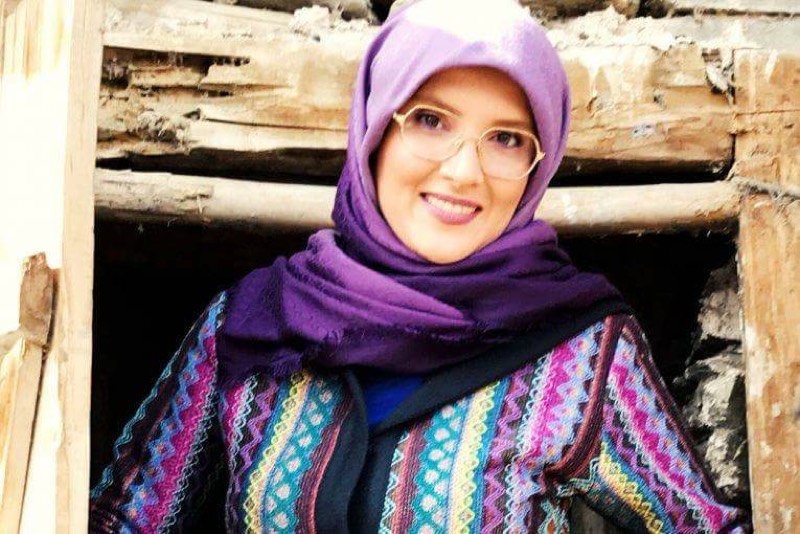Hunger-Striking Political Activist Detained Without Charge Writes Will in Evin Prison

After 24 days on hunger strike in Evin Prison in Tehran, reformist political activist Hengameh Shahidi, detained without charge and denied legal counsel since March 9, 2017, has written a will, her mother told the Center for Human Rights in Iran (CHRI).
“Hengameh called me today (Saturday, April 1) and she was in very bad shape,” said Nahid Kermanshahi in an interview. “She has chest pains and doesn’t have the strength to walk…She said she had handed her will to the interrogator.”
“I told Hengameh to stop it because I couldn’t bear it. But she said she had written a two-page will and told the interrogator to hand it to the family. She said, ‘I told the staff in the (prison) clinic and the interrogator that they would be responsible for whatever happens to me. Those in the position of authority will be held accountable. Mr. President (Hassan Rouhani), the Intelligence Ministry and the judiciary will be responsible for my death.’”
Shahidi has been on hunger strike since March 16.
“Hengameh was talking to me in the presence of her interrogator,” said Kermanshahi. “I don’t know what he was telling her, but Hengameh said she didn’t have the strength to walk and she had to drag herself on the floor. She said, ‘Tell everyone all about what’s happening to me and if you don’t, you will be indebted to me. Tell everyone I was not allowed any visits…’ She said, ‘I haven’t committed any crime and I won’t accept anything.’”
The 41-year-old reformist senior member of the Etemad Melli (National Trust) Party is a former reporter for the party’s Norooz newspaper and an adviser to opposition leader Mehdi Karroubi, under extrajudicial house arrest since 2011 for publicly challenging the vote count of Iran’s 2009 presidential election.
On March 9, security forces arrested Shahidi in the city of Mashhad, where she was helping arrange her grandmother’s funeral. She was flown overnight to Tehran and transferred to Evin Prison’s Ward 209, which is controlled by the Intelligence Ministry.
“Hengameh said her mouth would dry up while being interrogated for hours at a time and could not go on answering questions,” Kermanshahi told CHRI after speaking to her daughter on the phone. She said, ‘They are accusing me of a lot of things, but I didn’t accept any of them.”
Kermanshahi added: “Hengameh said she won’t permit being attached to an IV. She asked everyone for forgiveness and told me to wear white and sing ‘Dawn Bird’ (Iranian protest song) at her funeral. I told her to stop all this talk. She said she cannot be held in detention for more than a month (without charge) and by then she will either be back home or in a cemetery. She said she wants to donate her organs.”
In addition to being detained without charge, Shahidi has also been denied legal counsel, according to Kermanshahi.
“I just don’t know what my daughter has been charged with,” she told CHRI. “Neither does she. Her lawyer Mr. (Mostafa) Tork Hamadani wanted to follow up on her case, but he has been told that his credentials for the case have not yet been approved by the judiciary. That means she has no legal representation.”
“I reminded Hengameh that I recently had an angioplasty procedure on my heart and now I’m feeling worse,” she added. “I’m worried for her and I don’t know what to do and there’s no one who will give me answers.”
In a letter posted on her Instagram page two days after her arrest, Shahidi wrote she was being targeted “as part of a project to arrest political activists and journalists before the presidential election (May 19, 2017) so that the designated candidate (of hardliners) could be guaranteed a victory, just like in the 2009 election.”
“You were supposed to be a breath of fresh air for reformists after the oppressive years under (President Mahmoud) Ahmadinejad, and not choke the air out of them to become president like he did,” she wrote in a second letter published on March 15.
Since December 26, 2016, more than 22 journalists and rights activists—nearly all of them believed to be supporters of the centrist Rouhani—have been arrested by either the Intelligence Ministry, which answers to Rouhani, or the Islamic Revolutionary Guard Corps (IRGC), which answers only to Supreme Leader Ali Khamenei.
Shahidi was previously arrested on June 30, 2009 for supporting the peaceful protests against the disputed result of the presidential election that year and sentenced to six years in prison for “propagating against the regime,” “acting against national security” and “insulting the president” by Judge Yahya Pirabbasi of Branch 26 of the Revolutionary Court.
In June 2012 she was granted conditional release on medical grounds.






